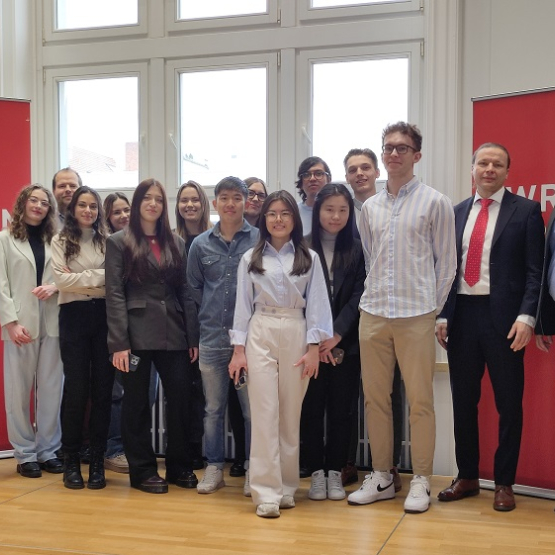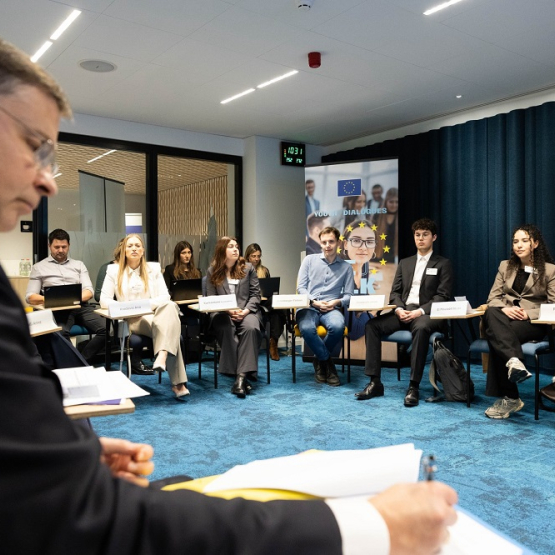Celebrations marking the 100th anniversary of Stanisław Wojciechowski becoming President of the Republic of Poland at the SGH Warsaw School of Economics

On 19th December, the SGH Warsaw School of Economics hosted a celebration of the 100th anniversary of Stanisław Wojciechowski, a professor affiliated with our university in 1919-1939, taking office as President of the Republic of Poland. The ceremony was attended by President Andrzej Duda and Deputy Marshal of the lower house of Polish Parliament (the Sejm), Małgorzata Kidawa-Błońska, great-granddaughter of Stanisław Wojciechowski.
The anniversary celebrations began in the afternoon with the unveiling of a plaque commemorating President Wojciechowski, designed and authored by Piotr Siwczuk, Ph.D., professor at the Academy of Fine Arts in Warsaw.
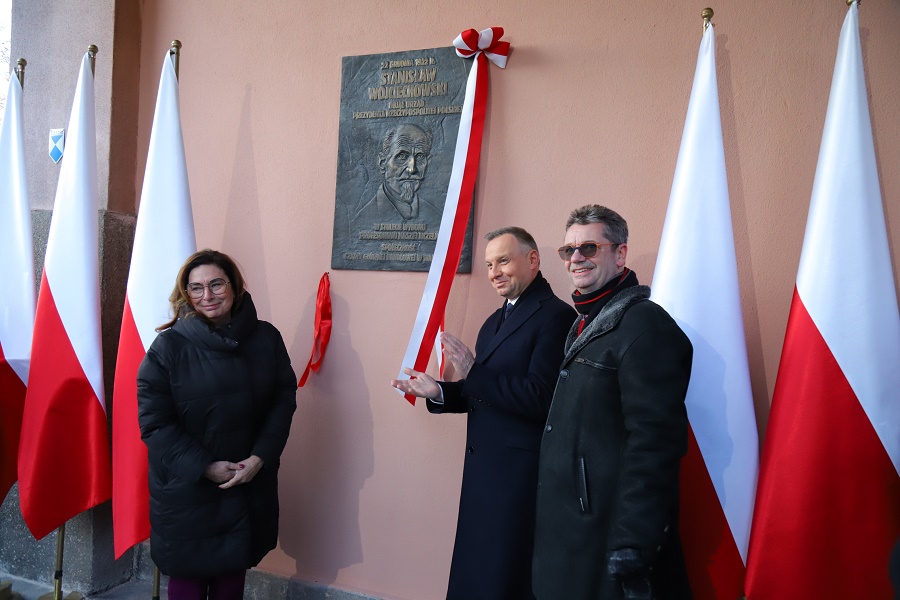
The guests were welcomed by SGH Rector Piotr Wachowiak.
“Stanisław Wojciechowski is a very important person in our academic community. A patriot, a scientist, the founder of the Department of Cooperatives. A righteous man who adhered to basic principles and values that are very important to us, such as truthfulness, honesty, respect for others. Mr. President prioritised the other person, this independence that he would show at every step. He was one of the main personalities who fought to regain Poland’s independence. And, most importantly, Professor Stanisław Wojciechowski is the President from SGH, and for this reason we are very proud,” said Rector Piotr Wachowiak.

Stanisław Wojciechowski “was, in fact, the first President of the Republic to actually hold office, struggling with the then extremely difficult turn of rebuilding Poland. He decided to take the office of President of Poland, to submit to this choice in incredibly difficult circumstances, right after the assassination, after the death of the first president of the reborn Republic of Poland Gabriel Narutowicz,” recalled President Andrzej Duda.
“We can realise the drama of those days and the situation in Poland at that time by counting the days that passed from the assassination until the election of the next president of Poland, President Wojciechowski. Only four days after the assassination, so quickly Poland needed to stabilise the political scene, so quickly the country needed to calm down in the face of the threat of, in fact, civil war, which could occur in view of the events of the time, the tragedy of those years. The President undertook this great mission,” stressed President Duda.
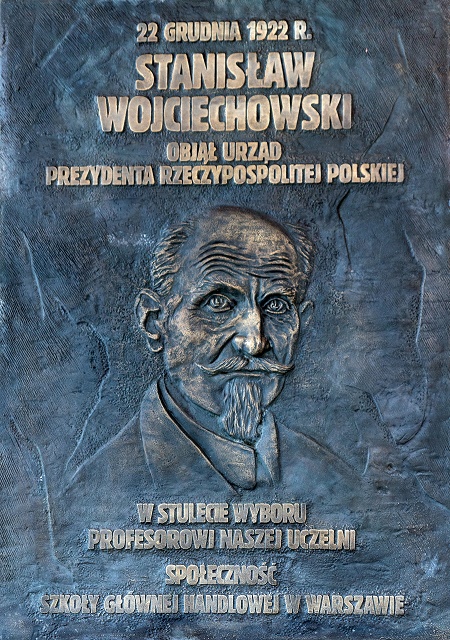
“For me, this is an extremely touching moment. And I would like to thank the entire academic community of the SGH Warsaw School of Economics very warmly for this, because it is very important that you are restoring the memory and history of my great-grandfather,” remarked Deputy Marshal of the Sejm Małgorzata Kidawa-Błońska.
“For me, he is a great-grandfather, a man who influenced my life, even though I didn’t know him. What the Rector was talking about, this respect for the other person, supporting the most vulnerable, helping the most vulnerable. Uniting to take action together, all the struggle and hard work to regain independence. And then the fact that in the most difficult moments of his life (…) – this is not only the May Coup but before that, his escape from the Tsar’s order to the UK, the May Coup, then the very important and difficult for him events of World War II– (…) he retained faith in his values, he retained integrity, he did not break any principles and he always acted in accordance with the law, the Polish constitution and the concept of honour,” said Deputy Marshal of the Sejm Kidawa-Błońska.
“Honour and integrity in his life were of great importance. And it seems to me that the fact that the School wants to cultivate precisely this integrity, honesty and respect for the law and treat this as a model for young people is a wonderful thing. Because you can be a great patriot, do a lot for Poland, and you don’t necessarily have to do that with a rifle in your hand. (This can be done) by building state institutions, teaching at the university and showing what is important in life (…),” noted the Deputy Marshal of the Sejm. “I wish that all of us, once the moment to say goodbye to this world arrives, wouldn’t have to worry so much. The last words in my great-grandfather’s life were: + What becomes of Poland+. I, for one, wish we didn’t have such worries, that everything would be fine and great.”
The ceremony, in addition to representatives of the SGH authorities, lecturers, students and School’s staff, was also attended by Secretary of State at the Chancellery of the President of the Republic of Poland Andrzej Dera, Secretary of the City of Warsaw Włodzimierz Karpiński, Mayor of the Mokotów District Rafał Miastowski, the author of the plaque prof. Piotr Siwczuk and Tytus Brzozowski, the author of the “President from SGH” mural, which will be unveiled on 22nd December.
The ceremony of plaque unveiling was followed by a visit to the commemorative exhibition presenting artefacts and family heirlooms related to Stanisław Wojciechowski, and the premiere of a documentary film titled “President from SGH” directed by Jacek Knopp and Mariusz Sielski. The title role was played by Olgierd Łukaszewicz in an honorary role.

At the end of the ceremony, President Andrzej Duda and Deputy Marshal of the Sejm Małgorzata Kidawa-Błońska placed an entry in the memorial book.
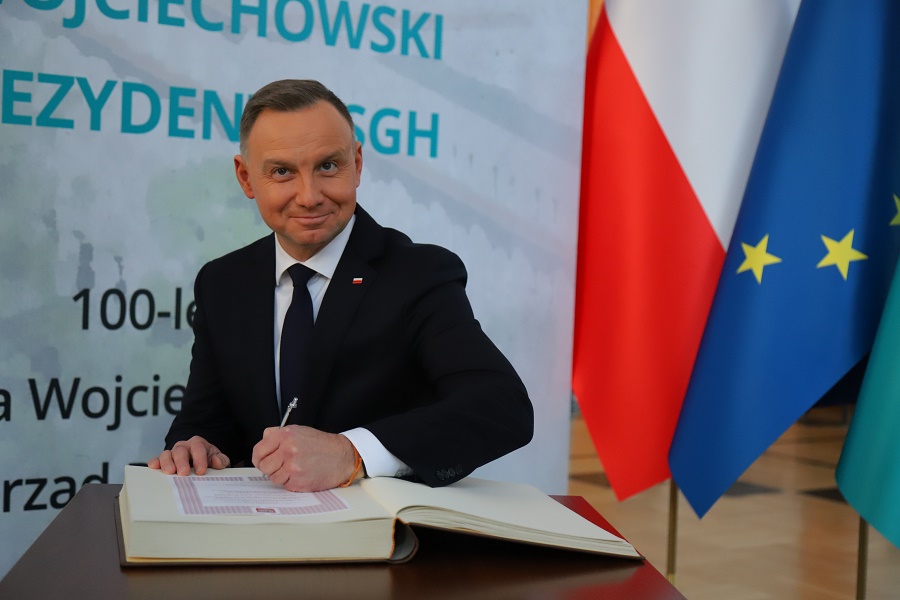

As part of the celebration, the unveiling of a mural commemorating the President from SGH made by Tytus Brzozowski, an architect and painter with ties to Warsaw, is scheduled for Thursday, 22nd December.
Earlier, on 18th November, SGH hosted an anniversary seminar prepared by the Department of Economic and Social History entitled “Stanisław Wojciechowski – politician, socialist, academic.” It was accompanied by an exhibition of Stanisław Wojciechowski’s scientific works and publications, prepared by the SGH Library.
On 12th October, an exhibition prepared by historians from the Department of Economic and Social History of the SGH Warsaw School of Economics: Jerzy Łazor, Ph.D., Andrzej Zawistowski, Ph.D., Prof. SGH, Jacek Luszniewicz, Ph.D., Prof. SGH, and Jacek Morawski (author of the graphic design) was presented.
Stanisław Wojciechowski was born on 15 March 1869 in Kalisz. He took up studies at the University of Warsaw in 1888. During this time, he was active in the student underground. He was forced to leave Warsaw in 1892. He went to Zurich and then Paris and London. In exile, he co-founded the Polish Socialist Party, printed “bibuła,” (a form of independent publishing) and supplied arms and printing presses to his country.
He returned to Warsaw in 1906 and took up the organisation of Polish cooperatives. He was appointed Minister for the Interior in January 1919, and participated in the drafting of the Constitution. At the same time, he began teaching at the Higher School of Commerce (later SGH). He taught there until the end of 1939. After the assassination of President Gabriel Narutowicz on 20 December 1922, he was elected President of Poland by the National Assembly. In 1924, an unsuccessful assassination attempt on President Wojciechowski took place in Lviv. On 14 May 1926, as a result of the so-called May Coup, Stanisław Wojciechowski resigned from office.
While in political retirement, Wojciechowski returned to research and teaching. He lived at 15 Langiewicza Street in a house which was deliberately set on fire by the Germans during the Warsaw Uprising. Together with his wife and thousands of Varsovians, he went through the Pruszków camp, and then settled in Gołąbki, where he died almost completely forgotten on 9 April 1953. He was buried in the Powązki cemetery.
Read more about Stanisław Wojciechowski in Gazeta SGH:
Stanisław Wojciechowski – the President from SGH

